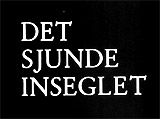
|
The Seventh Seal (1957, Swe.) (aka
Det Sjunde Inseglet)
In Swedish director Ingmar Bergman's influential, visually-imaginative,
psychological fantasy-drama and art-house film (considered a classic
landmark and film masterpiece) set in medieval times during the time
of the Black Plague and the Crusades; the striking images throughout
the film were due to the exquisite B/W cinematography of Gunnar Fischer;
the existential, thought-provoking film questioned serious religious
issues concerning the existence of God, the afterlife, Death, and
the loss of faith. The film's title was derived from the Biblical
Book of Revelation (chapter 8, verse 1).
[Note: Many were aware that the film's stark imagery
and basic plot became the subject of numerous comical spoof-parodies
including Monty Python and the Holy Grail (1975, UK) (the
flagellation sequence, the witch burning scene, and the mock-Swedish
subtitles), Woody Allen's Love and Death (1975), and Last
Action Hero (1993). Also, in Bill & Ted's
Bogus Journey (1991), Bill (Alex Winter) and
Ted (Keanu Reeves) challenged the Grim Reaper/Death (William Sadler)
to a series of board and party games, including Battleship, Clue,
electric football and Twister.]
|
Bill & Ted's Bogus Journey (1991)
|
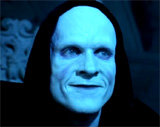
Grim Reaper/Death (William Sadler)
|
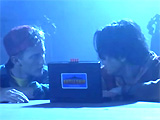
Bill (Alex Winter) and Ted (Keanu Reeves)
|
- during the Crusades and its
time of medieval war, the Black Plague and misery, disillusioned
and exhausted 14th century Swedish knight Antonius Block (Max von
Sydow) after ten years of military service was finally returning
home accompanied by his cynical squire Jöns (Gunnar Björnstrand)
- on their journey, the
Knight and Squire made a side visit to a rural church, where painter
Albertus Pictor (Gunnar Olsson) was drawing a series of frescos,
including a painting of a fresco of the Danse Macabre (a
dance of Death to the grave)
- the Knight engaged in grim dialogue
with a black-hooded and robed, white-faced Grim-Reaper figure of
Death (Bengt Ekerot) who threatened his existence; the
Knight had a lengthy confessional in the church's chapel to
a shrouded monk - when he delivered his deepest thoughts about wanting
a sign from God of his presence, in order to help his belief
- the Knight,
who had mostly lost his faith and was now tormented and uncertain,
bargained with Death - an emissary from God - to play an allegorical
game of Chess that would determine his fate - he would either win
(and survive) or lose (and forfeit his life). If the game was lost,
the Knight would be led away in a Dance of Death procession (danse
macabre); in a continuing stark scene set
on a desolate beach, a chess game was played between them
- the Knight's dialogue: "I
want to confess as best I can, but my heart is void. The void is
a mirror turned towards my own face. I see myself in it and I am
filled with fear and disgust. Through my indifference to my fellow
men, I have isolated myself from their company. Now I live in a
world of phantoms. I am imprisoned in my dreams and fantasies....(before
dying) I want knowledge... Call it whatever you like. Is it so
cruelly inconceivable to grasp God with the senses? Why should
He hide Himself in a mist of half-spoken promises and unseen miracles?
How can we have faith in those who believe when we can't have faith
in ourselves? What is going to happen to those of us who want to
believe, but aren't able to? And what is to become of those who
neither want to nor are capable of believing? Why can't I kill
God within me? Why does He live on in this painful and humiliating
way even though I curse Him and want to tear Him out of my heart?
Why, in spite of everything, is He a baffling reality that I can't
shake off? Do you hear me?...I want knowledge, not faith, not surmises,
but knowledge. I want God to stretch out His hand towards me, reveal
Himself and speak to me....I call out to Him in the dark, but it's
as if no one was there....time on Earth is a preposterous horror.
No one can live in the face of Death, knowing that all is nothingness...But
one day, they will have to stand at that last moment of life and
look towards the darkness...We must make an idol of our fear, and
that idol we shall call God"
- during the confessional,
the Knight divulged his chess strategy to outwit and delay Death
during the game, in order to discover 'one meaningful deed' in
his life: "Death visited me this morning. We are playing chess together....My life
has been a futile pursuit, a wandering, a great deal of talk. All
this was meaningless, indeed. I say it without bitterness or self-reproach,
because the lives of most people are very much like this. But I
will use my reprieve for one meaningful deed....(Death) is a skillful
tactician, but I yet haven't lost one piece. I am playing a combination
of the bishop and the knight which he hasn't yet discovered. In
the next move, I'll shatter one of his flanks"
- meanwhile, the Knight encountered an itinerant
acting troupe performing a Passion play. The caravan actors included
lute-playing juggler and artist Jof (Nils Poppe) with his Mia (Bibi
Andersson) and their infant son Mikael (Tommy Karlsson). Their
names resembled the names of the Joseph and Mary couple. Early
one morning, Jof had a vision of the Holy Virgin Mary walking with
the infant Jesus in a nearby field
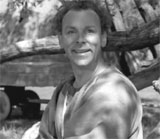
Jof Experiencing a Vision in a Nearby Field
|
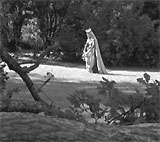
The Virgin Mary with the Infant Jesus
|
- Jof's simple faith enabled him to envision the existence
of a human afterlife with a heaven and hell, while the Knight's visions
were frustrating, elusive and not reassuring about a spiritual world
after death; by way of contrast, the philosophizing and skeptical
Knight felt tormented by an unseen God whom he thought was mocking
him and remained hidden and vague; for him, life was meaningless
and to be dreaded if there was no hope for life after death; however,
in moments with Jof and Mia, the Knight became
hopeful and enjoyed being alive
- the Knight found brief relief and peace sharing fellowship
during an outdoor picnic meal with the couple who were enjoying natural
foods - wild strawberries and a bowl of milk. The dining sequence
functioned as a symbolic, liturgical ceremony of the Eucharistic
with bread and wine without supernatural overtones; Antonius offered
the actors safe passage through a forested area to his castle
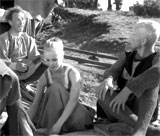
Sharing a Family Meal of Wild Strawberries and a Bowl
of Milk
|
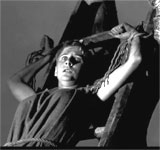
The Insane Witch Burned at a Stake
|
- Antonius' only witnessing of organized
religion was to observe a procession of flagellants and the burning
at the stake of a Witch (Maud Hansson) - an insane female accused
of consorting with the Devil
- as the film's chess game drew to a close, the Knight
knocked the pieces over to buy more time, and to allow the young family
he had met to outrun Death (and the Black Plague); however, Death
reset the chess board and stated emphatically: "No one escapes me";
Death would soon visit the Knight one last time
- in the film's conclusion after
reuniting with his wife Karin (Inga Landgré) and family
during a final supper sequence, Death arrived to interrupt the
Knight. He had just affirmed that he had forestalled Death long enough
to be able to perform a single, final comforting and redemptive good-will
act ("one
meaningful deed") that provided some significant meaning in his
life; the mute servant girl (Gunnel Lindblom) turned from the table
to greet the figure of Death in the shadows with a Biblical reference
to Jesus' final statement on the cross: "It is finished"
- in
the final sequence, Jof (with another paranormal experience) watched
as the Knight and his companions were led away over the hillside
in a wild, solemn and macabre Dance of Death
|
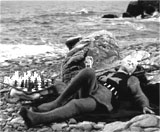
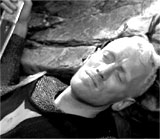
Knight Antonius Block (Max von Sydow)
on Beach Returning From Crusades
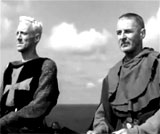
Block with Squire Jöns (Gunnar Björnstrand)
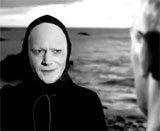

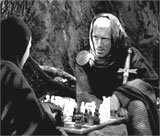
The Continual Allegorical Chess Game Between the Knight
and Death
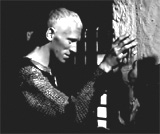
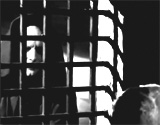
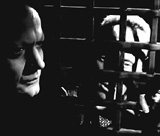

Discussions Between the Knight and the Shrouded Grim Reaper/Death
Figure
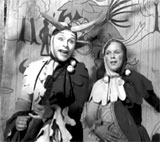
Performers Jof and Mia
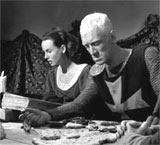
The Knight's Last Supper With His Family
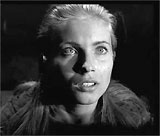
The Mute Servant Girl: "It is Finished"

The Concluding Image: A Macabre Danse of Death Taking
the Knight Away
|















